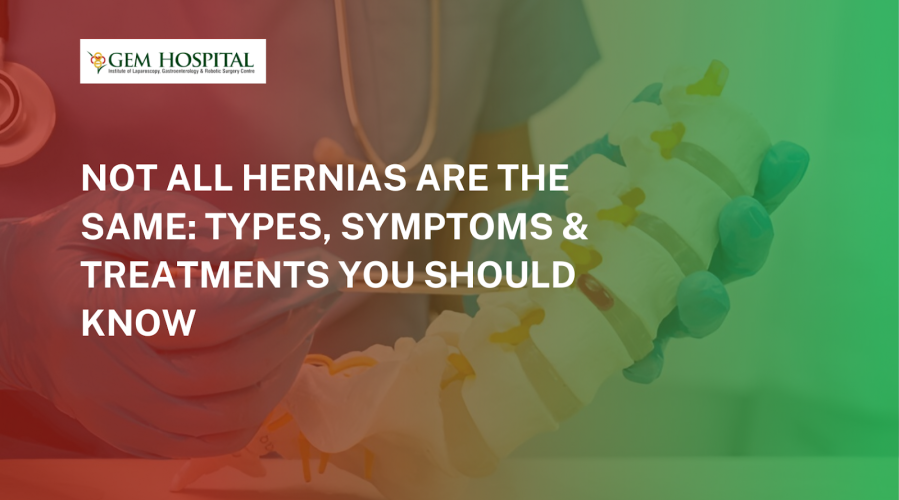Learn effective solutions for digestive problems with expert tips to improve gut health, reduce discomfort, and maintain a healthy digestive system.
Not All Hernias Are the Same: Types, Symptoms & Treatments You Should Know

When most people hear the term "hernia", they likely think of a rupture in the stomach region or groin. However, there are different types of hernia, each with unique causes, symptoms, and treatments.
Whether you are researching on your own behalf or for a loved one, the first step towards timely diagnosis and management is understanding hernia symptoms and types, so let's simplify it.
Common Types of Hernias
Let’s look at the most common hernia types:
1. Inguinal Hernia
- Location: Groin area (more common in men).
Cause: Weakness in the lower abdominal wall.
Symptoms:
- Bulge in the groin or scrotum.
- Pain or discomfort, especially when bending, lifting, or coughing.
- Heaviness or dragging sensation.
Treatment: Typically treated with open or laparoscopic hernia repair surgery.
2. Femoral Hernia
Location: Upper thigh, just below the groin (more common in women).
Symptoms:
- Bulge near the upper thigh.
- Pain when walking or lifting.
- Higher risk of strangulation compared to inguinal hernias.
Treatment: Prompt surgical repair is usually recommended.
3. Umbilical Hernia
Location: Around the belly button (common in infants, but also seen in adults).
Symptoms:
- Soft bulge near the navel.
- Discomfort or pain when coughing or lifting.
Treatment:
- In infants: Often resolves on its own by age 1-2.
- In adults: Surgery is typically required.
4. Incisional Hernia
Location: At the site of a previous surgical incision.
Symptoms:
- Bulge at or near a scar.
- Pain, especially after exertion.
Cause: Weakening of the abdominal wall post-surgery.
Treatment: Surgical correction using mesh reinforcement.
5. Hiatal Hernia
Location: Upper part of the stomach pushes into the chest through the diaphragm.
Symptoms:- Heartburn or acid reflux.
- Difficulty swallowing.
- Chest pain or shortness of breath.
Treatment:
- Mild cases: Lifestyle changes and medications.
- Severe cases: Surgery may be required.
Less Common Types of Hernias
While the above are the most frequently diagnosed, other rare forms include:
- Epigastric Hernia – Occurs between the navel and lower part of the ribcage.
- Spigelian Hernia – Occurs on the side of the abdominal wall.
- Obturator Hernia – Found deep in the pelvis, often causing pain in the inner thigh.
Recognizing Hernia Symptoms Early
Understanding hernia symptoms and types is crucial for early intervention. Some general symptoms include:
- A visible bulge under the skin.
- Pain or discomfort in the affected area.
- Swelling or pressure, especially during physical activity.
- A burning or aching sensation at the site.
In severe cases, symptoms such as nausea, vomiting, and inability to pass gas may signal a strangulated hernia, a medical emergency requiring immediate attention.
Diagnosis and Treatment Options
Diagnosis typically involves a physical examination, and in some cases, imaging tests like an ultrasound, CT scan, or MRI may be needed for internal hernias or complications.
Treatment depends on the type and severity:
- Watchful Waiting: In some asymptomatic cases.
- Lifestyle Changes: For hiatal hernias—avoiding spicy food, losing weight, etc.
Surgery:
- Open Hernia Repair (Herniorrhaphy): Traditional method.
- Laparoscopic Surgery: Minimally invasive with faster recovery.
- Robotic Surgery: Advanced option with more precision.
Mesh repair is commonly used in many surgical techniques to reduce the risk of recurrence.
Can Hernias Be Prevented?
While not all hernias are preventable, you can reduce your risk by:
- Avoiding heavy lifting without proper form.
- Maintaining a healthy weight.
- Treating chronic cough or constipation.
- Strengthen your core muscles gradually.
When to See a Doctor
If you notice any bulge, or you experience pain in your abdomen or groin or near a previous surgical scar, don't ignore it. Early evaluation may help to avoid complications and facilitate a quicker recovery.
Let the Experts at GEM Hospital Help You
At GEM Hospital we have a dedicated team of laparoscopic and robotic surgery specialists, have treated thousands of patients with a vast array of hernia symptoms and types, with precision and care. As an established centre of excellence in minimally invasive surgery, we provide individualized treatment pathways, allow for quicker recovery times, and obtain world-class outcomes.
Don't allow a hernia to affect your daily activity or continuity of your health. Schedule an appointment with us today, and allow our experts to guide you to the best treatment for your hernia condition.
Blogs & Article
Explore current research trends in digestive health, including new treatments, advanced diagnostics, and innovations improving gut health and patient care.
Discover common digestive health myths and the real facts. Learn simple tips to improve gut health and maintain better digestion for a healthier life.


